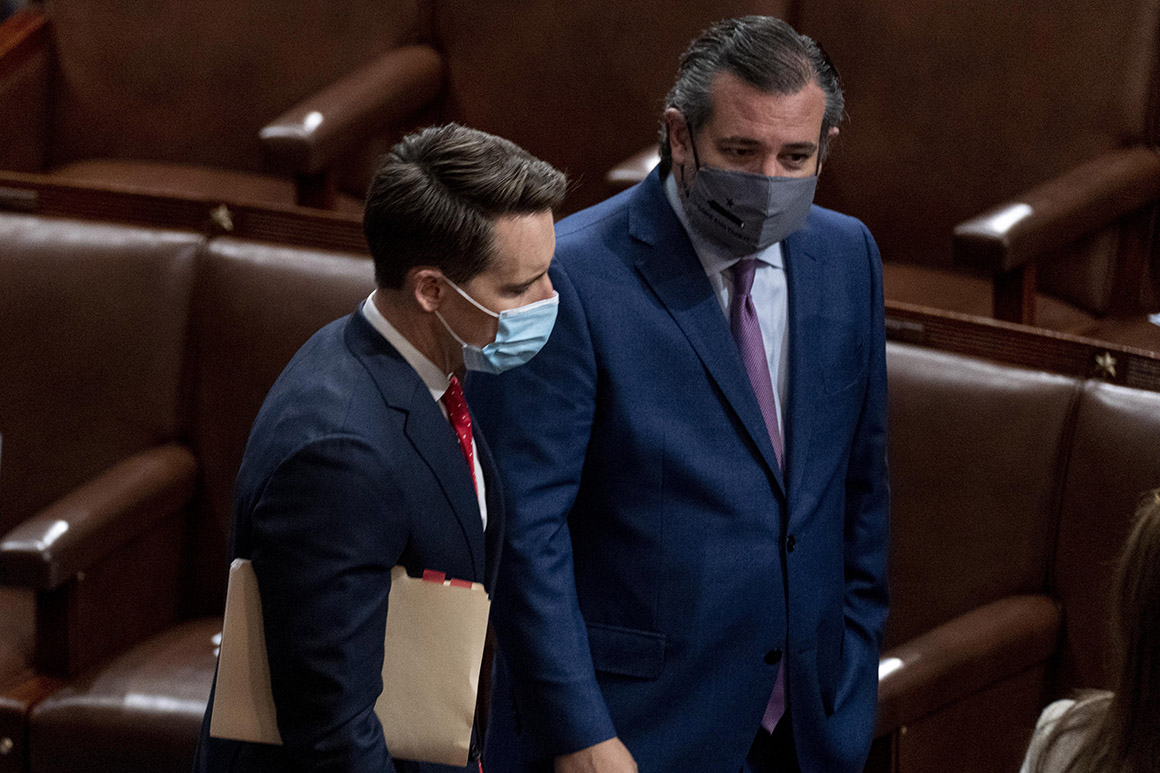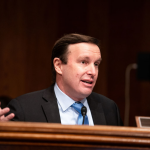Democrats stepping into the Senate majority this month are weighing stiff penalties for Republican Sens. Josh Hawley and Ted Cruz over their objections to the 2020 presidential election results.
Hawley (R-Mo.) and Cruz (R-Texas) spearheaded objections to Pennsylvania’s Electoral College votes even after a pro-Trump mob stormed the Capitol demanding that the election be overturned, prompting Democrats to accuse them of inciting violence for political gain — claims the senators have vigorously denied.
The House impeached President Donald Trump earlier this week for inciting the deadly insurrection at the Capitol, and Democrats argue that Hawley and Cruz should face similar consequences. Some have called on them to resign or be expelled from the Senate altogether, which is unlikely to happen; but others are coalescing around an official rebuke in the form of a censure.
Sen. Chris Murphy (D-Conn.) this week joined the growing calls for Hawley and Cruz to be censured, but said the penalties under consideration should also extend to the six other GOP senators who joined them in objecting to the election results, including Sens. Rick Scott of Florida and Tommy Tuberville of Alabama. Even though the others were less vocal about their objections, Murphy said they were all “legitimizing this view amongst the crowd [of rioters] that Congress had the power to overturn the election.”
“If it really was only the two of them, maybe the unreasonable expectation that all these rioters had would have been dampened,” Murphy said, adding: “So I also don’t love the idea that all of the shame is being targeted to just those two senators. I think everybody who signed onto that letter deserves blame as well.”
Some Democrats have gone even further. Sen. Sherrod Brown (D-Ohio) said the pair should resign and that if they don’t, the Senate should expel them from the chamber, adding that they “have betrayed their oaths of office and abetted a violent insurrection on our democracy.” Even Sen. Chris Coons of Delaware, a centrist Democrat who works closely with Republicans, called on Hawley and Cruz to step down.
Sen. Ron Wyden (D-Ore.) was even more direct, accusing them of trying to “foment a violent mob for personal gain.”
The push for consequences comes as the Senate is about to kick off Trump’s second impeachment trial and begin processing President-elect Joe Biden’s Cabinet nominees as well as his Covid-19 relief plan.
A spokesman for incoming Senate Majority Leader Chuck Schumer (D-N.Y.) declined to comment on what Democrats might pursue as punishment for the two GOP senators once they take control of the chamber later this month, though several options remain on the table.
Amid the backlash, Hawley and Cruz are doubling down on their objections and their rhetoric leading up to the violent riots at the Capitol, which resulted in the deaths of five people including a police officer.
Cruz told POLITICO last week that he was simply seeking a debate on the Senate floor, and that “what I was doing was the exact opposite of inciting violence.” Hawley penned an op-ed this week stating that he maintained his objections even after the riots at the Capitol because “I will not bow to a lawless mob, or allow criminals to drown out the legitimate concerns of my constituents.”
Still, their fellow Republicans viewed the senators’ election objections as more of a bid to cater to the GOP base with Trump on his way out, and position themselves for presidential runs in 2024. Senate Majority Leader Mitch McConnell (R-Ky.) opposed their efforts and had tried to persuade members of the GOP Conference to vote to certify the election results, in part to avoid putting senators facing re-election in 2022 in a difficult spot.
Sen. Mitt Romney (R-Utah) said the group of senators who objected “will forever be seen as being complicit in an unprecedented attack on our democracy,” while Sen. Ben Sasse (R-Neb.) described Hawley’s conduct as “really dumbass.”
But most Republicans aren’t likely to back a formal condemnation on the Senate floor.
“I think it’d be a partisan exercise,” said a GOP senator who was granted anonymity to candidly assess the situation. “They appear to be getting de facto censured out in the public.”
Even if Democrats opt against a formal penalty, they could still charge the Senate Ethics Committee with investigating Hawley and Cruz. Additionally, several Democratic senators have already said they don’t intend to work with the pair again on legislation. Hawley, for example, has partnered with Democrats on his push for stimulus checks.
“I won’t work with those Republicans,” Sen. Tina Smith (D-Minn.) said bluntly. “However, it’s important to remember that there are many, many a majority in the Senate of Republicans who I work with on a daily basis, and I will continue to do that.”
And independent of congressional action, both senators have already faced significant blowback. Simon & Schuster canceled publication of Hawley’s forthcoming book, and Cruz’s communications director resigned.
Moreover, former aides to Sen. Claire McCaskill (D-Mo.), whom Hawley defeated in 2018, launched a super PAC aimed at blocking Hawley’s ambitions for higher office or for re-election to his Senate seat. And former Sen. John Danforth (R-Mo.), Hawley’s mentor, renounced his support and said his effort to help groom Hawley for public office “was the biggest mistake I’ve ever made in my life.”
Burgess Everett and Marianne LeVine contributed to this report.




















